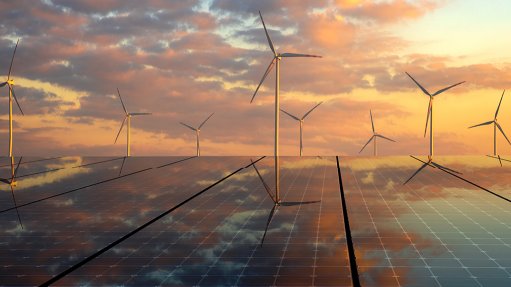Biofuel is it really the answer to the world energy crisis?
This article has been supplied as a media statement and is not written by Creamer Media. It may be available only for a limited time on this website.
The world energy crisis and increased greenhouse gas emissions have been the driving force for alternative and environmentally friendly biofuel. In addition fast growing population, industrialization and increased fossil fuel usage have contributed to an ever increasing search for renewable sources of sustainable energy. Global warming as a direct result, requires consequential leaders in the quest to combat this ever increasing environmental destruction..
Currently there are three types of generational biofuel. The first derived from crop plants, such as soybeans, corn, maize, sugar beet, and sugar cane have created a discord due to the negative impact on food security.
Producing this type of biofuel is a process that break materials down into a type of mash. Enzymes break down into sugars, which then goes through a fermentation process with yeast to produce alcohol and a plant by-product.
The mash goes through a filtration process to separate the alcohol and plant by-products. The alcohol then goes through an additional heat refinement process to turn it into ethanol, which results in biofuel.
The second type of biofuel are derived from nonedible oils such as jatropha curcas, pongamia pinnata, simarouba glauca to name a few.
Microalgae which belong to the third generational type of biofuels have been researched for the usage of biofuel, biodiesel, bioethanol and jet fuel.
The ethanol from plant materials are called biofuel because the production and combustion of ethanol completes a cycle. The amount of water and carbon dioxide that plants use are returned back to the atmosphere when ethanol is combusted. The use of ethanol reduces air pollution and is nontoxic.
The purpose of biofuel is to deliver more efficient and immediate energy solutions. Biomass that creates biofuel gives a renewable fuel option to many. Companies who are supplying biomass and creating biofuel qualifies for carbon credits in America under the Kyoto Protocol.
The Kyoto protocol operationalize the United Nations Framework Convention on Climate Change by committing industrialized countries and economies in transition to limit and reduce greenhouse gases emissions in accordance with agreed individual targets. The Convention itself only asks those countries to adopt policies and measures on mitigation and to report periodically. The protocol is based on principles and provisions of the Convention and follows its annex- based structure. Overall the Annex B under the Kyoto Protocol targets 37 industrialized countries and economies, these targets add up to an average of 5 per cent emission reduction compared to 1990 levels.
A company that has been doing more than most over an extensive period of time is USP&E. USP&E is an award winning company renowned for their work in Operations and Maintenance services. USP&E has been studying biomass and biofuel and have been running projects in the United States of America, Canada, and Botswana.
According to Will Gruver (CEO) “At USP&E we care about finding solutions for our clients. The ‘E’ in USP&E stands for Environment and when doing business we always endeavour to make the best environmental choices. My team and I have been studying Biomass and Biofuel for an extensive number of years. Biofuel is the future of energy in the world, it will aid countries around the world, to depend less on foreign oils and the ultimately reward, nations across the globe will be removed from the current contaminated climate dilemma".
Comments
Press Office
Announcements
What's On
Subscribe to improve your user experience...
Option 1 (equivalent of R125 a month):
Receive a weekly copy of Creamer Media's Engineering News & Mining Weekly magazine
(print copy for those in South Africa and e-magazine for those outside of South Africa)
Receive daily email newsletters
Access to full search results
Access archive of magazine back copies
Access to Projects in Progress
Access to ONE Research Report of your choice in PDF format
Option 2 (equivalent of R375 a month):
All benefits from Option 1
PLUS
Access to Creamer Media's Research Channel Africa for ALL Research Reports, in PDF format, on various industrial and mining sectors
including Electricity; Water; Energy Transition; Hydrogen; Roads, Rail and Ports; Coal; Gold; Platinum; Battery Metals; etc.
Already a subscriber?
Forgotten your password?
Receive weekly copy of Creamer Media's Engineering News & Mining Weekly magazine (print copy for those in South Africa and e-magazine for those outside of South Africa)
➕
Recieve daily email newsletters
➕
Access to full search results
➕
Access archive of magazine back copies
➕
Access to Projects in Progress
➕
Access to ONE Research Report of your choice in PDF format
RESEARCH CHANNEL AFRICA
R4500 (equivalent of R375 a month)
SUBSCRIBEAll benefits from Option 1
➕
Access to Creamer Media's Research Channel Africa for ALL Research Reports on various industrial and mining sectors, in PDF format, including on:
Electricity
➕
Water
➕
Energy Transition
➕
Hydrogen
➕
Roads, Rail and Ports
➕
Coal
➕
Gold
➕
Platinum
➕
Battery Metals
➕
etc.
Receive all benefits from Option 1 or Option 2 delivered to numerous people at your company
➕
Multiple User names and Passwords for simultaneous log-ins
➕
Intranet integration access to all in your organisation


















